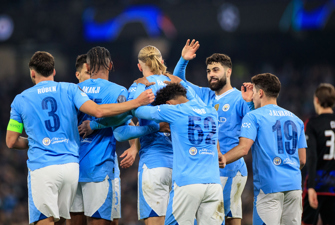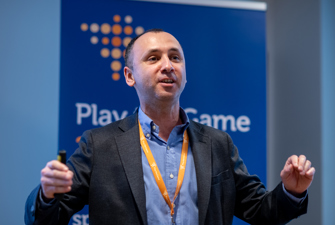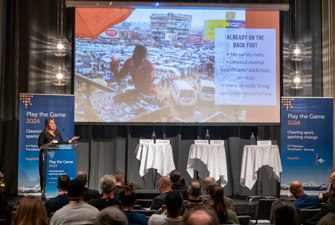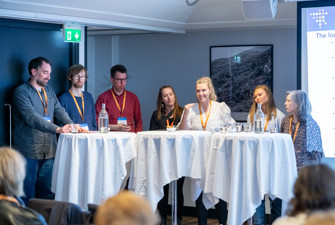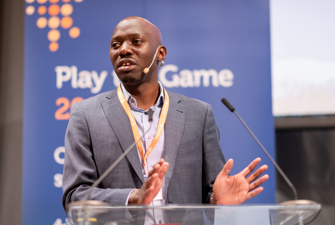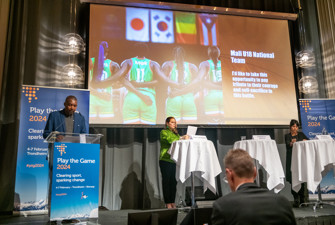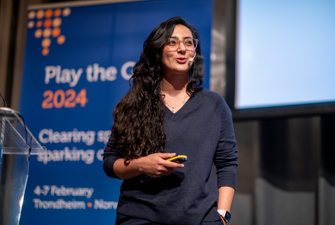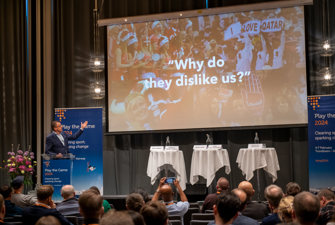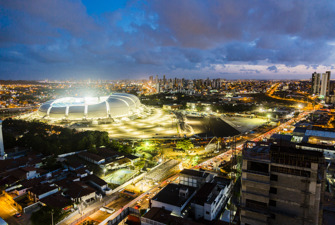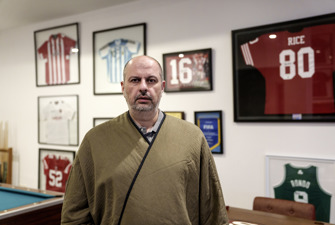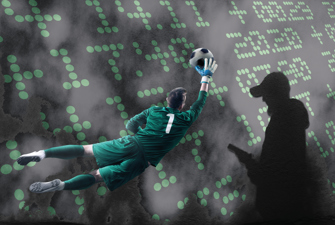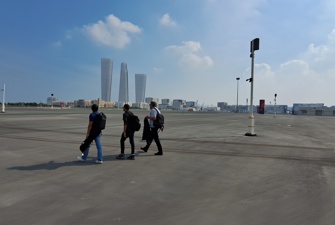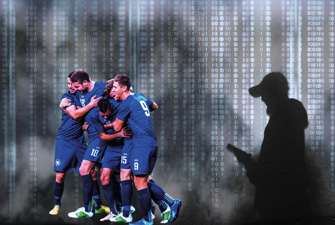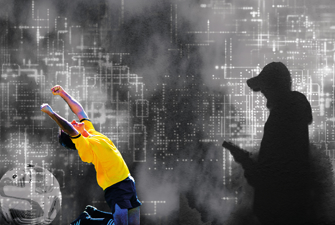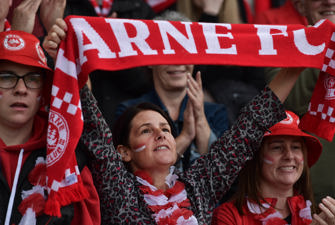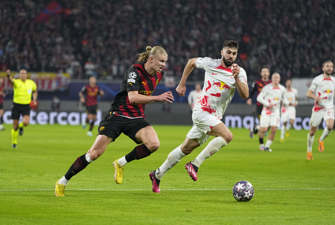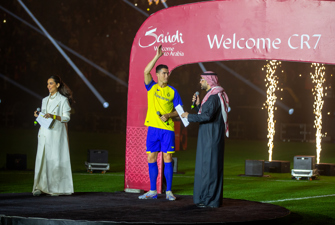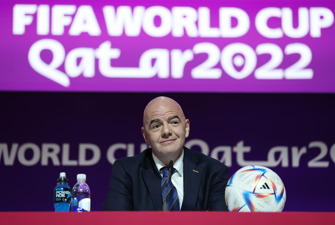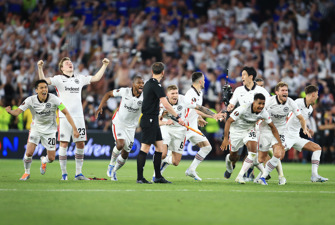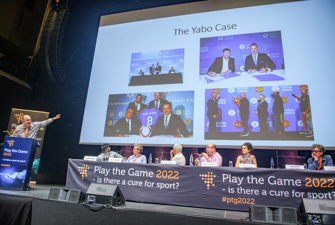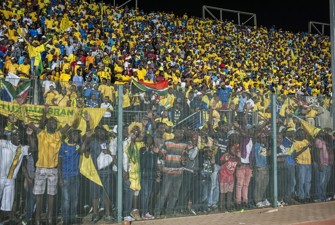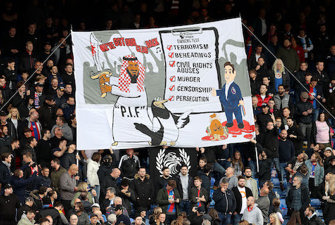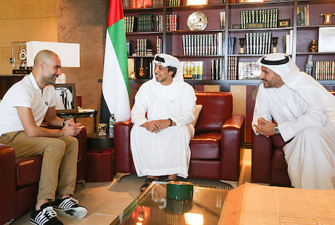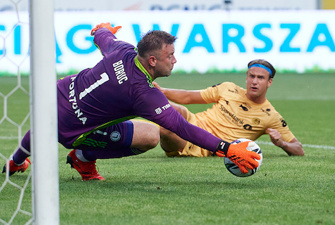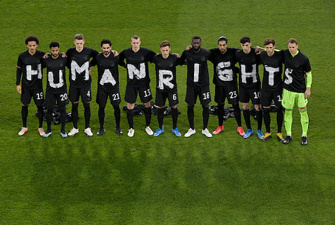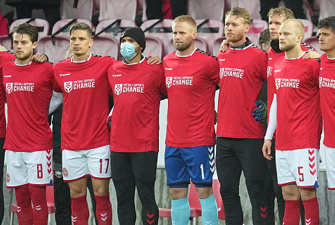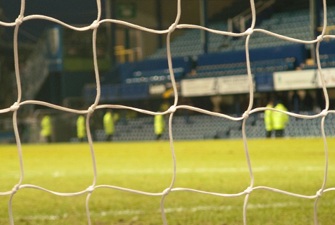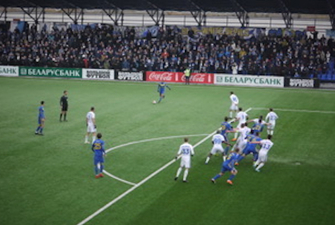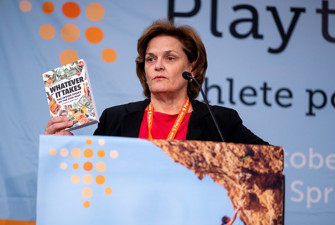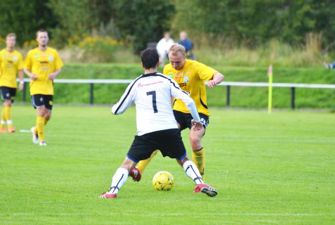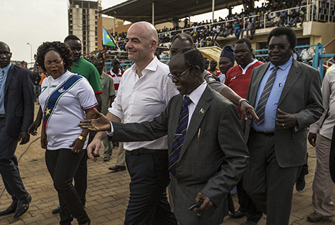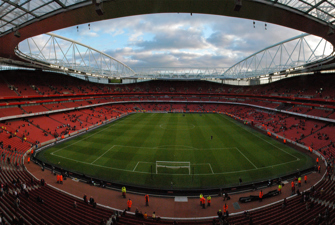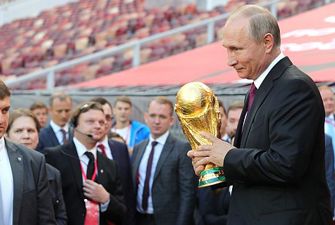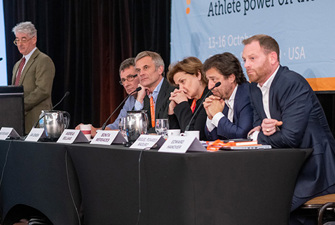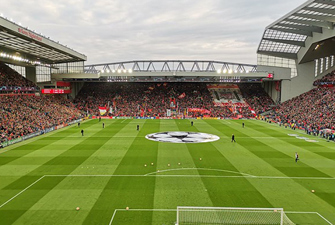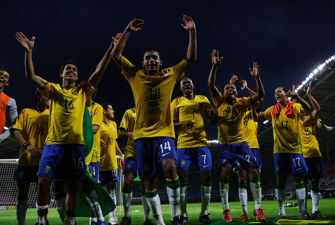FIFA’s choice for new president in African football cements crisis in CAF
ANALYSIS: The recent election of South African Patrice Motsepe as new president of the Confederation of African Football shows how FIFA continues to meddle in African football politics leaving little hope of much needed reforms.
On the eve of Egypt and Zimbabwe kicking off the 32nd edition of Africa Cup of Nations in 2019, Ahmad Ahmad, then president of the Confederation of African Football (CAF), convened a press conference under the main stand at Cairo International Stadium and read out a press statement. In an unprecedented move, he confirmed that FIFA – in the form of their Senegalese Secretary General, Fatma Samoura – would supervise CAF’s affairs for the next six months.
In the months prior to Fatma Samoura’s appointment, the CAF president had been subject to serious corruption allegations. As revealed by several international media outlets, Ahmad Ahmad had – amongst other wrongdoings – commissioned the rather obsucre French company Tactical Steel to supply sportswear for a forthcoming CAF tournament despite the company’s lack of experience in performing such jobs. The arrangement was difficult to make sense of, until it surfaced that Ahmad Ahmad, through his attaché Loic Gerand, is a close friend of the owner of Tactical Steel, Romauld Seillier.
Fast forward to today, April 2021, a little more than a year and a half later, the deal between CAF and FIFA made official in Cairo has expired. Nevertheless, the crisis of African football’s governing body persists, and arguably it has grown bigger despite the election of a new president.
Infantino paved the way for Motsepe
On Friday 12 March 2021, Ahmad Ahmad – who has now been suspended by FIFA– got replaced as CAF president by Patrice Motsepe, a South African mining magnate with an estimated wealth of USD 3.1 billion and former owner of Mamelodi Sundowns, the 2016 winners of CAF Champions League.
Just like his predecessor, he is FIFA president Gianni Infantino’s man. Originally the South African was one of four candidates for CAF presidency, but in the weeks leading up to the election held in Rabat, Morocco, Infantino defied the pandemic and toured Africa in an attempt to promote Motsepe’s candidacy.
After visiting eleven countries in ten days he succeeded. Just a week shy of the election, Motsepe’s rivals – Ivorian Jacques Anouma, Senegalese Augustin Senghor and Mauritanian Ahmed Yahya – suddenly all withdrew their candidacies, and announced support for Motsepe. In return, Senghor and Yahya were promised posts as respectively 1st and 2nd vice presidents, while Anouma was offered the position as Motsepe’s special advisor.
What maybe seemed to be a renewed commitment to Pan-African collaboration, was rather the result of Gianni Infantino violating FIFA’s own rules about confederative independence and trying to control world football’s largest constituency. Just to top it off, he made sure that Swiss-Congolese Veron Mosengo-Omba, his old friend from college and FIFA’s Chief Member Associations Officer, was appointed as CAF’s new Secretary General.
The election of Patrice Motsepe thus leaves CAF’s integrity seriously damaged. The confederation is not only in huge financial difficulties, with head of CAF’s finance committee Morocco’s Fouzi Lekjaa announcing in Rabat that its cash reserves are severely limited after the termination of a USD 1 billion television and marketing rights deal with France-based company Lagardere Sports. It is also emblematic of the increasingly anti-democratic nature of international football politics.
When Ahmad Ahmad’s tenure began in 2017, he promised administrative reforms and financial transparency. The authoritarian days of Cameroonian Issa Hayatou — CAF president since 1988 — were supposed to be over. But the Malagasy failed to deliver. The circumstances of Patrice Motsepe’s election are not indicating institutional changes. Africa’s governing football body is, in other words, losing its public credibility.
According to Simon Akindes, a former Benin international and now professor of political science at University of Wisconsin-Parkside and member of the research organisation Sports Africa Network, the state of African football is as worse as ever.
“CAF is in a very difficult position. They do not have the means to govern football as they should, they lack long-term vision and creativity, and as a result the quality of African football is, broadly speaking, on a downward trajectory”, he says.
From discrimination to playing a vital role in football politics
As CAF’s current problems follow a recognisable pattern, it is important to understand the history of the Confederation. Formed in 1957, just as the first African nations began to gain independence from Europe’s colonial powers, it was initially thought of as a Pan-African initiative contributing to a new common identity across the continent.
Within FIFA some Eurocentric decision-makers were concerned. Already at that time the world body was based on the principle of “one nation, one vote.” With the introduction of CAF, Africa would become the most important constituency due to its size and number of countries. The fundamental power structure of international football politics simply was at risk of changing.
Artemio Franchi – then president of the Italian Football Federation – was quoted as saying that the prospect of African FIFA members was “uncomfortable”, while UEFA president at the time, German Gustav Weiderkehr, argued that the situation was “dangerous”.
Accordingly, CAF was bullied on several fronts. The Confederation was kept out of influence on every possible occasion, and the African national teams were discriminated again and again in the allocation of World Cup slots. In response to the latter, Ghana’s president (and CAF founder), the great Pan-Africanist Kwame Nkrumah, backed an African boycott of the qualifying rounds to the 1966 World Cup in England.
It was not until the election of Brazilian João Havelange as FIFA president in 1974 that CAF’s fortunes changed. In contrast to his predecessor, England’s Stanley Rous, he recognised the advantages of embracing the African member associations and performing third world solidarity. Despite continued reserverations from Europeans, who refused to cede any of their traditional privileges, he increased the number of African World Cup participants.
Since then CAF has been a vital part of international football politics. Paul Darby, sports sociologist at Ulster University and writer of Africa, Football and FIFA: Politics, Colonialism and Resistance, explains:
“With the election of Havelange, senior FIFA executives became more concerned about facilitating CAF’s aspirations in the world game. It was an exercise in real politik and a recognition that fulfilling promises and obligations to CAF was critical in terms of maintaining positions of power in the world body”.
This was especially evident when Swiss Sepp Blatter and Swedish Lennart Johansson vied for the FIFA presidency in 1998 as Paul Darby points out:
“CAF was a vital constituency in this election. Issa Hayatou, then CAF president, officially declared that all members of the African confederation were supporting Johansson’s bid, but when the election took place, Blatter was able to split CAF’s vote, amid allegations of corruption, and won. In that sense Blatter’s position at the helm of world football was rooted in reciprocal relations with CAF. In short, if the continued to support the African game, CAF was more likely to support his aspirations to remain as FIFA president.”
Prioritised and marginalised at the same time
Gianni Infantino has not only continued along the same lines. With the election — or the selection as some critical observers prefer to say — of Patrice Motsepe as CAF’s new president, Infantino has taken FIFA’smeddling in African football politics to a new and more intrusive level.
Never before has a FIFA president so blatantly interfered in an electoral process of a supposedly independent confederation. CAF increasingly resembles “a FIFA department” as an unnamed president of a member association recently told the well-informed Norwegian football magazine Josimar. Tellingly, it was Infantino himself who contrary to custom, delivered the opening speech at the General Assembly in Rabat, not CAF’s interim president Omari Constant of DR Congo.
What follows is that Africa’s current position in world football is highly paradoxical. The continent seems to be both heavily prioritised and heavily marginalised by the top of the game. Prioritised in the sense that FIFA indeed is showing serious interest in the present as well as the future of African football. And marginalised in the sense that one could argue that this attention from FIFA actually is a just question of consolidating European influence and Gianni Infantino’s position in global football politics – and not because the president wants to make a genuine difference for the ones CAF represents: African players and fans – from Algiers in the North, to Cape Town in the South, from Dakar in the West to Kampala in the East.
On the surface the future of African football looks fairly promising. Already in February last year, when Fatma Samoura pulled out of CAF after finishing her supervision, Gianni Infantino hosted a seminar in Rabat where he outlined his wish to “project African football to the top of the world.”
He talked about professionalising Africa’s referees and mobilising CAF for further investment, but most prominently he put forward the idea of a new pan-African club competition consisting of 20 of the best clubs from the continent buying themselves in. In a tweet posted in march by Barbara Gonzalez, the CEO of Tanzanian powerhouse Simba SC, it was confirmed that talks about the new competition format has begun.
It sounds quite appealing and could potentially increase attendance figures, but Professor Simon Akindes rather wants CAF to start a reform process from the bottom, not the top:
“It is important to start with the basics. We have to realise the situation African football finds itself in, and understand that it won’t change much if the reforms only target the very top of the game.”
Is FIFA part of the problem or the solution?
One of CAF’s main challenges is a number of weak and inefficiently managed member associations. Across most of Africa, football federations are under heavy influence from their countries’ ministries of sport, which means that the state of the FA’s has a tendency to be tied to that of the nation as a whole. Conflicting interests at state level filter through to football politics. A sustainable reform process of CAF has to take this into account, Simon Akindes argues:
“It’s the whole purpose of CAF that needs to be looked at. The confederation should not serve the interests of a narrow elite affiliated with FIFA and big corporations, but the interests of the grassroots in African football.”
No matter what you think of Gianni Infantino’s proposed changes to African football, it is hard to argue against the urgent need for reforms. As he said at last year’s CAF/FIFA seminar in Rabat: “We have to reflect about how we can revolutionise African football.”
Too few leagues are being televised. Too few people are going to games. Too many clubs are depending on patrons. Too many talents are seeking away from the continent at the first given option. Too little revenue is generated. Too often the national team calendar is afflicted by bad logistics. The question, is though whether FIFA is a part of the solution – or maybe rather a part of the problem?
“It’s important to remember that CAF is no more ‘controversial’ than the world body itself. As the events of 2015, and FIFA’s ‘crisis’ revealed, corruption and poor governance was institutionalised in the highest echelons of the world body,” Paul Darby points out.
Simon Akindes agrees. The leading institutions of African football needs to make reforms in their own image, not FIFA’s:
“There is no doubt that CAF has a problem with corruption, but it has to be said that much of it is engineered by FIFA itself. Going forward CAF has to re-think itself outside of today’s dominant neoliberal paradigm. It is the only way to create a healthy and sustainable system.” he says.
Motsepe’s plans are still unclear
We are yet to see what exactly Patrice Motsepe’s plans are, but as a businessman that has created his wealth by private enterprise, they are hardly close to what Simon Akindes suggests.While the South African was tight-lipped and refused to answer questions about CAF’s governance issues during the General Assembly in Rabat, he revealed a bit more at a press conference in Johannesburg a few days later.
Sitting along Danny Jordaan – Motsepe’s ally, fellow countryman and president of SAFA, the South African Football Federation – the new CAF president confirmed that Africa Cup of Nations will be kept in a two-year cycle (contrary to previous hints from Infantino, interestingly), but in general he did not manage to expand on his ten-point action plan made public at the end of February. Motsepe wants to “invest in youth and the future of African football” and “develop and grow women’s football”, but just how remains to be seen.
However, what we already are seeing – and what we have been seeing ever since Gianni Infantino became FIFA president – is a confederation which according to Simon Akindes continues to follow the historical tendency of being subject to FIFA dominance:
“The paternalistic attitude is still there and still complicating the historically difficult relationship between FIFA and Africa,” he says.
Play the Game has reached out to numerous sources close to Patrice Motsepe – among them his 1st vice president Augustine Senghor, Danny Jordaan from SAFA and his Nigerian ally, president of the NFF, Amaju Pinnick – but none of them have wished to comment.
